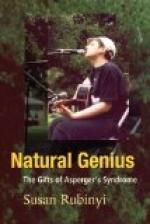saddens while it delights. Solitude, verily,
was stretched out asleep in the sun upon the length
of sandy beach and beetling promontory; and I sat and
gazed now over the boundless waters, now into the
devouring abysses opened by the bending crests of
the billows, and anon into the gloomy depths of the
forest or the serene and measureless openings of the
sky. What grandeur in every line transcendent!
Yet what impenetrable mystery too, what menacing ruin
to the small remnant of human life still spared from
the generations in ages past, already swallowed up!
Peering around in this pensive mood, in which the
joy of being mixed with the uneasy doubt of its tenure,
my eye fell at last on the spire of a little church,
rising like a pencil of light to heaven, out of the
fathomless waste. And there my soul alighted
and found rest. Like some sea mark to the voyager,
that slender shaft, reared by the social religion
of the world, stood to tell me where in the universe
I was; the common Christian consciousness reinforced
my own, and dark queries and agitating uncertainties
subsided from my spirit, as the deluge from the dove
that Noah sent out to pluck the green branch of promise.
From the illimitable reaches of the huge, but dimly
responding creation around, the slight, frail temple
for God’s praise drew me to its welcome and
peaceful embrace. As I approached it, the tolling
of the bell struck on my ear in a touch of gladder
tidings than I had received from all the melody of
the great wind-harp of the trees, with all the soft
accord of the tossing billows. Stroke after stroke,
distinctly falling, seemed to bring to me the echoes
of a million holy telegraphic towers all over the
surface of the globe; and when I came to stand under
the eaves of the small sanctuary, the measured turning,
in the belfry, of the wheel, by revolutions such as
I had seen long years ago in my childhood, filled my
eyes with gracious tokens, that were not drawn from
me by the sublime circling of the sun and moon, then
moving east and west in their spheres. The final
tone of praise in the great ascription to God is, in
its fullness, supplied by a revelation greater than
blessed the times of David. A new and sweeter
string is strung upon the lyre his royal fingers so
nobly swept, and the voice of thanksgiving is more
highly raised for an “unspeakable gift.”
The kingdoms of nature are the chords on the harp we
may sound to the Creator of all. There has been
of late much discussion as to the place nature should
hold among religious influences and appeals, some
super-eminently exalting her, and others putting her
in contrast and almost opposition with all spirit,
beauty and truth. This is no place, nor has the
present writer inclination, here, to take part in the
grand debate, infinitely interesting as it is, on
either side. He would only catch, or repeat and
prolong the strain of an old and sacred ode—he
would contribute a meditation. He would run the
matchless ancient verse into a few particulars of
fresh and modern illustration, content if he can make
no melody of his own, to recall for some, perhaps not
enough heeding it, the Hebrew music that has lingered
so long on the ear of the world.




